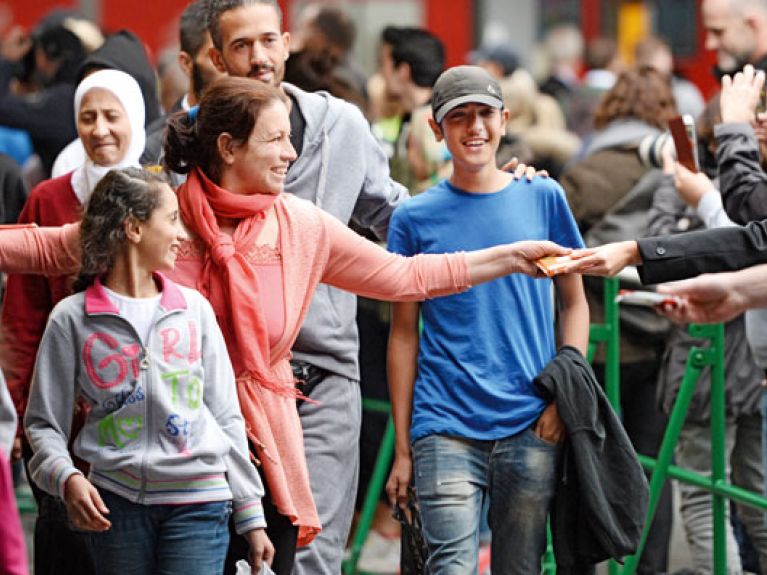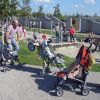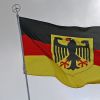Welcome after a long time fleeing
Germany expects around 800,000 refugees to arrive by the end of the year. Many citizens welcome them, and the federal government has announced a multi-billion euro support package

That they hadn’t expected: a welcoming round of applause. The refugees smiled bashfully when walking through the exit of Munich’s Main Railway Station – past citizens who held up homemade signs saying “Welcome” in German, English, or Arabic. Some of the refugees themselves started clapping, applauding those who had joyfully received them.
Scenes like this were to be repeated many times – in Munich, where during the first weekend of September alone more than 10,000 people arrived, but also in Dortmund and in Frankfurt am Main. Around 800,000 refugees, or so the federal government estimates, will seek asylum in Germany by the end of 2015 – a massive increase. In 2014, the number was slightly more than 200,000 persons seeking a safe haven, ten years ago around 40,000. Many of the new arrivals come from Syria. The UNHCR calculates that at present every minute a family leaves the country so ravaged by civil war – and that can be felt in Germany, too. In July 2015 every fourth application for asylum was filed by a refugee from Syria.
Along with the numbers, the willingness to help has risen, too. An ever greater number of Germans are acting voluntarily – be it in one of the many initiatives that have popped up or through charities, sports clubs or church communities. They donate clothing, help set up provisional shelters, or go to the refugee centres to play with the kids and help teach the adults German.
However, with the numbers of refugees so the pressure on the politicians rises. For this reason, the Federal government launched an immediate assistance programme in early September: It is making six billion Euros available to handle the challenges. Moreover, changes to building law will make it easier to swiftly create accommodation that is winter-proof. At the same time, the Grand Coalition plans to declare the Balkan countries of Albania, Kosovo and Montenegro as safe countries of origin. Many people seeking asylum likewise come from there, but their applications are rarely successful. Serbia, the FYR Macedonia and Bosnia and Hercegovina have already been declared safe countries of origin.
What must now happen is for there to be support for the countries of origin and the point-of-entry host countries in swiftly and effectively helping the refugees. Appropriate humanitarian assistance provided locally in these countries is a necessary precondition for people not being forced to flee owing to a lack of provisions. Germany is accordingly planning to continue the urgently necessary humanitarian assistance measures in the crisis regions in question. This includes, for example, setting up emergency accommodation, as well as providing food, medical and psychological support for the refugees and distributing toiletries.
Moreover, Germany is busy trying to find solutions at the European level. “I am confident that we can also master this challenge, if we in all of Europe can create a sense of shared responsibility,” said Federal Chancellor Angela Merkel. The objective is a regulation covering the fair distribution of the refugees.
The Chancellor and members of her cabinet unconditionally condemned attacks on refugee centres. Deputy Chancellor Sigmar Gabriel called for zero tolerance of racism. “You don’t represent us,” said Federal President Joachim Gauck with a view to the xenophobic perpetrators. By contrast, he lauded the commitment of volunteers as a gesture of the “bright Germany” that opposes discrimination and offers those seeking protection a ray of light.

